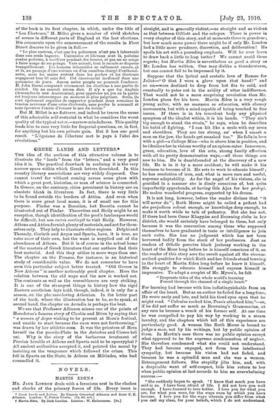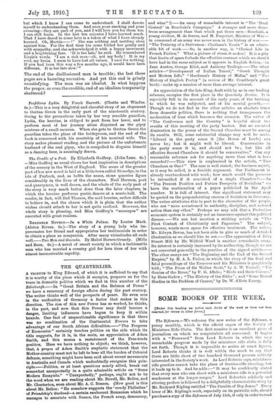NOVELS.
MARTIN EDEN.t
Ma. JACK Lownox deals with a ferocious zest in the clashes and shocks' of the primary forces of life. Every issue is • Greek Lands and Letters. By Francis Greenleaf Allinson and Anne C. E. Allinson. London : T. Fisher Uowin. lie. 6d. not.]
t Mantis Eden. By Jack London. London : W. Heinemann. Ens.]
straight, and is generally violent —as straight and as violent as that between Gilliatt and the octopus. There is power in every chapter of this story, and at moments there is grandeur; but how much more power there might be if only Mr. London had a little more prudence, discretion, and deliberation! He spoils his art with a pounding emphasis. Will be ever learn to draw back a little to leap better ? We cannot avoid these regrets ; but Martin Eden is nevertheless as good a story as Mr. London has written. One may dislike a thunderstorm, but one cannot fail to be impressed by it.
Suppose that the lyrical and ecstatic love of Romeo for Juliet—" 0 that I were a glove upon that hand! " and so on—were destined to drop from hot fits to cold, and eventually to peter out in the aridity of utter indifference. That would not be a more surprising revolution than Mr. London plans for his hero. Martin Eden is a very rough young sailor, with no manners or education, with clumsy movements, but with a mind capable of being touched to fine issues. If there is in his truculent body any physical symptom of the idealist within, it is his hands. "They ain't big enough to stand the strain," he says, when he describes his habit of fighting. "I can hit like a mule with my arms and shoulders. They are too strong, an' when I smash a man on the jaw, the hands get smashed too." He falls in love with a girl—a College Miss—who is above him in position, and he idealises her in visions worthy of an opium-eater. Innocence, grace, education, love of the arts, strong family affection with all its pretty demonstrative ways,—all these things are new to him. He is dumbfounded at the discovery of a new life. He is in it by a mere accident; he will make it his business to become of it. He sets to work to educate himself ; he has resolution of iron, and, what is more rare and useful, supreme adaptability. As for the angel of his visions, she is gratified in a manner she is dimly conscious of, but quite imperfectly apprehends, at having this Ajax for her prot-:ge.
He makes wonderful progress, supported by his dream.
It is not long, however, before the reader divines that " it will never do" ; Ruth Morse might be called a pedant had she prejudices robust enough, or knowledge deep enough, to make it worth while to talk of pedantry. But she has not.
If there had been Omar Khayytim and Browning clubs in her district, she would certainly have belonged to them, but only because it was the convention among those who supposed themselves to have graduated in taste or intelligence to join such cults. She has no judgment which has not been borrowed bodily from the stock of her professors. Just as readers of Othello perceive black jealousy working in the heart of the Moor long before he is himself conscious of it, so the reader of this story sees the revolt against all the circum- scribed qualities for which Ruth and her friends stand brewing in the heart of Martin Eden long before he knew it himself. His struggle to educate himself and express himself is impressive. To adapt a couplet of Mr. Myers's, he felt "Desperate tides of the whole world's learning Forced through the channel of a single heart."
For learning had become with him indistinguishable from an affair of the heart. But as an author he failed for a longtime.
He wrote early and late, and held his tired eyes open that he might read. " Calculus racked him, Tussis attacked him,"—or, if he did not suffer so much as Browning's Grammarian, at any rate he became a wreck of his former self. At one time he was compelled to pay his way by working in a steam laundry, and the chapters which tell of this experience are particularly good. A woman like Ruth Morse is bound to judge a man, not by bis writings, but by public opinion of them. In Martin's case there was no public opinion except what appeared to be the supreme condemnation of neglect.
She therefore condemned what she could not understand. They had become engaged, not from true intellectual sympathy, but because his vision had not faded, and because he was a splendid man and she was a woman.
Estrangement follows. She stupidly jilts him, and, with a despicable want of self-respect, bids him return to her when public opinion at last accords to him an overwhelming success "She suddenly began to speak: 'I know that ranch you have said is so. I have been afraid of life. I did not love you well enough. I have learned to love better. I love you for what you are, for what you were, for the ways oven by which you have become. I love you for the ways wherein you differ from what you call my class, for your beliefs, which I do not understand.
but which I know I can come to understand. I shall devote myself to understanding them. And even your smoking and your swearing—they are part of you, and I will love you for them too. I can still learn. In the last ten minutes I have learned much. That I have dared to come here is a token of what I have already learned. Oh, Martin— ! ' She was sobbing and nestling close against him. For the first time his arms folded her gently and with sympathy, and she acknowledged it with a happy movement and a brightening face. 'It is too late,' he said. He remembered Lizzie's words. `I am a sick man—oh, not my body ! It is my soul, my brain. I seem to have lost all values. I care for nothing. If you had been this way a few months ago, it would have been different. It is too late now: " The end of the disillusioned man is terrible ; the last three pages are a haunting narrative. And yet this end is grimly unsatisfying. The man was an idealist. Is what happens the proper, or even the credible, end of an idealism temporarily shattered ?







































 Previous page
Previous page